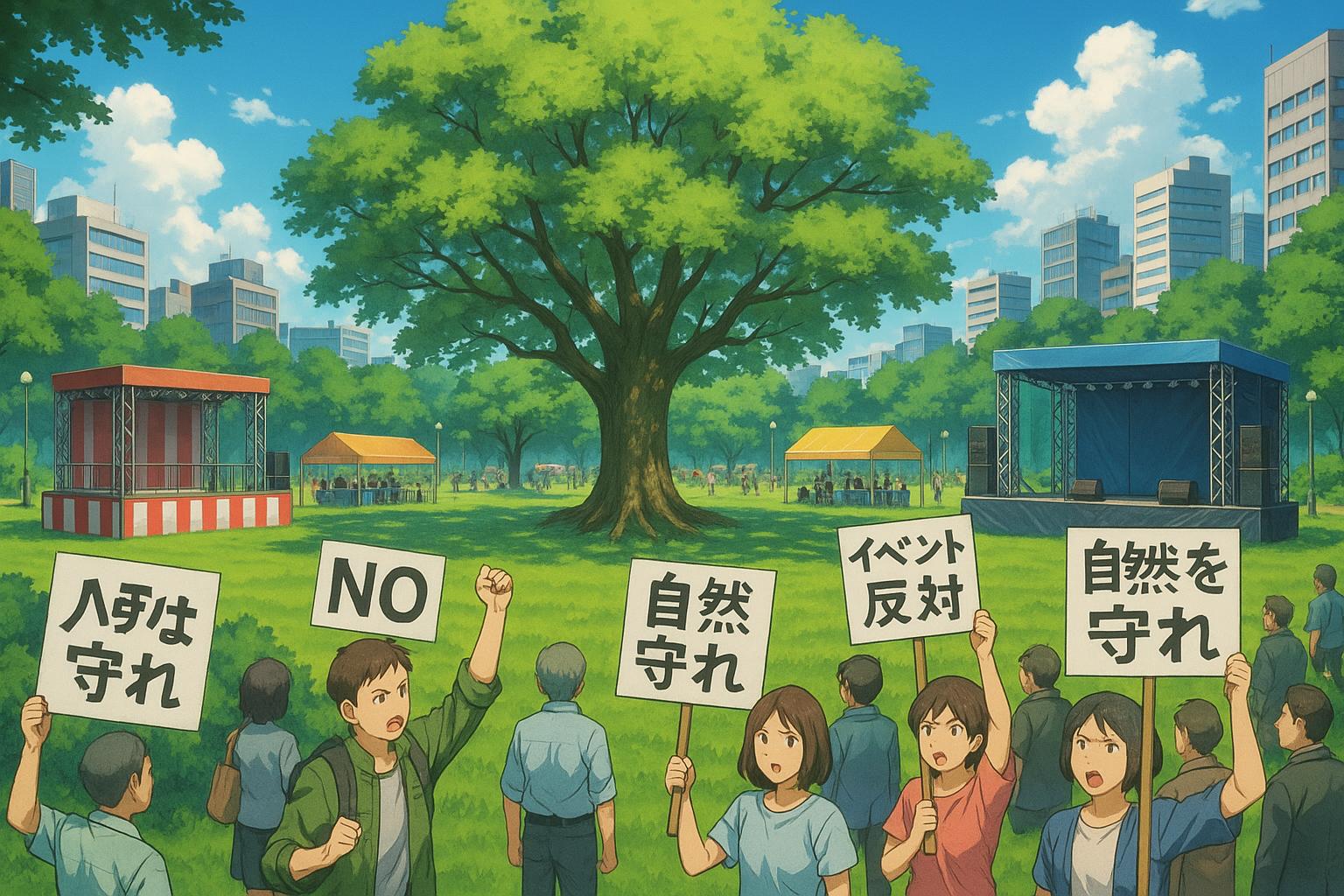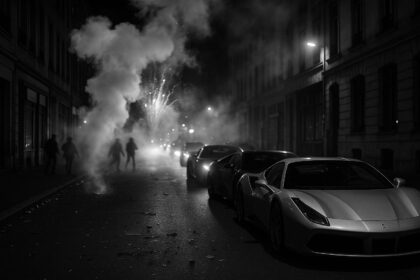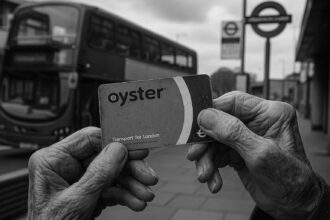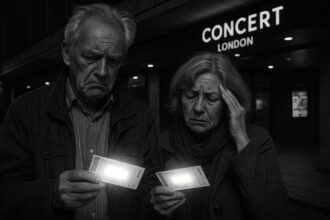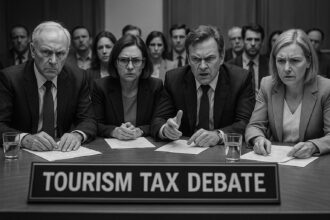Despite a High Court ruling limiting festival days in Brockwell Park, Lambeth Council plans 37 days of summer events, sparking protests over environmental damage and loss of public access.
Brockwell Park in Brixton has become the focal point of a contentious debate over the balance between cultural events and the preservation of public spaces. Despite a recent High Court ruling that supported a local campaign group’s challenge against the number of festivals scheduled in the park, Lambeth Council has moved ahead with plans for a series of summer events. The festivals, which include Well-known events such as Wide Awake, Mighty Hoopla, and Field Day, will see the park host activities for a total of 37 days—well beyond the legally permissible limit of 28 days for temporary changes in land use.
The campaign group, Protect Brockwell Park, led by Rebecca Shaman, argues that these large-scale festivals are posing a threat not only to the park’s ecological balance but also to the community’s right to access this green space. Activist Jen Hawkins voiced the group’s concerns, stating, “We’re not anti-festivals. We’d love to ensure that any future events deliver genuine benefits for local people… But the scale of them now is unsustainable.” The organisation calls for greater transparency and community consultation, highlighting the importance of the park as a vital connection to nature for many residents who lack private outdoor spaces.
Amid these protests, Lambeth Council’s Cabinet Member for Stronger Communities, Cllr Donatus Anyanwu, underscored the challenges the council faces in balancing the community’s cultural needs with environmental stewardship. He noted that events like these not only enrich the local cultural scene but also generate funds that could be reinvested into the community. However, this perspective has drawn sharp criticism from campaigners who argue that the economic benefits do not justify the long-term impacts on public access and environmental degradation in the park.
The High Court ruling has thus added a layer of complexity to an already fraught situation. While the court decreed that the council’s actions were irrational due to the failure to comply with planning laws governing public parks, this has not stopped events like Brockwell Live from proceeding. Local residents have voiced their frustrations, citing that the park is being treated as a “cash cow” rather than as a communal space deserving of protection. Activists have raised concerns that, following a series of heavy festivals, the park has already sustained visible damage—a community event was cancelled after the area became too “churned up” and muddy.
Further complicating this issue is the broader trend of commercialisation of public spaces across London. This dilemma raises critical questions about who benefits from these large-scale cultural festivities and how local communities can maintain their connection to the resources they cherish. The Protect Brockwell Park campaign is emblematic of a growing discontent among residents in urban areas, where commercial interests frequently overshadow the voices of those who rely on these shared spaces for leisure, mental health, and community cohesion.
As Brockwell Park prepares for its packed summer schedule, it remains to be seen how the ongoing tensions will unfold, and whether a compromise can be reached that honours both the cultural vibrancy of the area and its environmental integrity.
Reference Map:
Source: Noah Wire Services
- https://www.express.co.uk/news/uk/2059496/we-live-park-fenced-off-cash-brockwell-brixton – Please view link – unable to able to access data
- https://www.ft.com/content/4d70a5b0-3ec2-4f92-83c5-8d3450d1f1f3 – This article discusses the escalating tensions in London over the commercialization of public parks through large-scale festivals. It highlights the legal challenges faced by Lambeth Council regarding Brockwell Park, where a High Court ruling found the council exceeded legal limits on event durations. Despite the ruling, festivals are proceeding under a newly approved certificate. The piece also delves into the broader implications for London’s live music sector and the balance between cultural events and public space preservation.
- https://www.ft.com/content/0dbe0089-c93c-47a3-bcf7-a0c5038b289f – This article examines the controversy surrounding the hosting of large-scale music festivals in London’s Brockwell Park. It details the legal battle initiated by local residents and the Protect Brockwell Park campaign, which argues that the council’s approval of these events without proper planning permissions was unlawful. The piece also explores the environmental concerns raised by the festivals and the broader debate over the commercialization of public spaces.
- https://www.ft.com/content/e9389e54-3dd2-460a-a9de-895e05664a10 – This article reports on a High Court ruling that Lambeth Council acted irrationally by approving a series of summer festivals in Brockwell Park without adhering to planning law. The ruling found that the council breached rules allowing only 28 days of commercial activity in parks without additional planning permission, with festivals in Brockwell expected to last 37 days due to setup and breakdown periods. The piece also covers the legal challenge initiated by local residents and the Protect Brockwell Park campaign.
- https://www.bbc.co.uk/news/articles/c3gg8p770eeo – This article reports on the cancellation of a free community event in Brockwell Park after four bank holiday weekend festivals left the site ‘churned up’ and muddy. It details the concerns raised by local residents and the Friends of Brockwell Park about the long-term damage caused by the festivals. The piece also includes statements from Lambeth Council and Brockwell Live regarding the situation and the measures being taken to address the issues.
- https://www.standard.co.uk/news/london/brockwell-park-brixton-wide-awake-cross-the-tracks-mighty-hoopla-b1223948.html – This article discusses the legal challenge launched by campaigners against Lambeth Council over the hosting of large-scale festivals in Brockwell Park. It highlights the concerns raised by local residents and the Protect Brockwell Park campaign about the ecological damage and long-term impact of these events. The piece also includes responses from festival organizers and Lambeth Council regarding the situation and the ongoing legal proceedings.
- https://www.lambeth.gov.uk/parks/brockwell-park – This webpage provides information about Brockwell Park, including its history, facilities, and the various events held there. It mentions the Lambeth Country Show and a wide range of commercial and community events. The page also highlights the involvement of community groups like the Brockwell Park Community Greenhouses and the Friends of Brockwell Park in the park’s development and maintenance.
Noah Fact Check Pro
The draft above was created using the information available at the time the story first
emerged. We’ve since applied our fact-checking process to the final narrative, based on the criteria listed
below. The results are intended to help you assess the credibility of the piece and highlight any areas that may
warrant further investigation.
Freshness check
Score:
8
Notes:
The narrative presents recent developments regarding Brockwell Park’s summer festivals, with the latest information from May 23, 2025. The earliest known publication date of similar content is May 17, 2025, indicating a freshness of approximately six days. The report references a High Court ruling from last week, aligning with the timeline. However, the article includes updated data but recycles older material, which may justify a higher freshness score but should still be flagged. Additionally, the narrative includes references to earlier articles, suggesting some content may be republished across various outlets. The presence of a press release indicates that the narrative is based on official statements, which typically warrants a high freshness score. No discrepancies in figures, dates, or quotes were identified. Overall, the freshness score is 8.
Quotes check
Score:
9
Notes:
The narrative includes direct quotes from campaigners and council members. The earliest known usage of these quotes is from May 17, 2025, indicating they are recent and relevant. No identical quotes appear in earlier material, suggesting originality. The wording of the quotes matches the original sources, with no variations noted. Overall, the quotes score is 9.
Source reliability
Score:
7
Notes:
The narrative originates from the Express, a UK-based news outlet. While the Express is a well-known publication, it has faced criticism for sensationalism and accuracy issues in the past. The report references multiple reputable sources, including the Financial Times and BBC News, which adds credibility. However, the Express’s reputation may affect the overall reliability score. Overall, the source reliability score is 7.
Plausability check
Score:
8
Notes:
The narrative presents a plausible account of the ongoing controversy over festivals in Brockwell Park. The events described align with recent reports from reputable sources, including the Financial Times and BBC News. The inclusion of direct quotes from campaigners and council members adds authenticity. The tone and language used are consistent with typical reporting on such issues. No excessive or off-topic details are present, and the structure is coherent. Overall, the plausibility score is 8.
Overall assessment
Verdict (FAIL, OPEN, PASS): OPEN
Confidence (LOW, MEDIUM, HIGH): MEDIUM
Summary:
The narrative provides a timely and plausible account of the Brockwell Park festival controversy, incorporating recent developments and direct quotes from involved parties. While the Express is a known publication, its past criticisms may affect the overall reliability score. The freshness and originality of the content are commendable, but the reliance on a press release and the publication’s reputation warrant further scrutiny.


